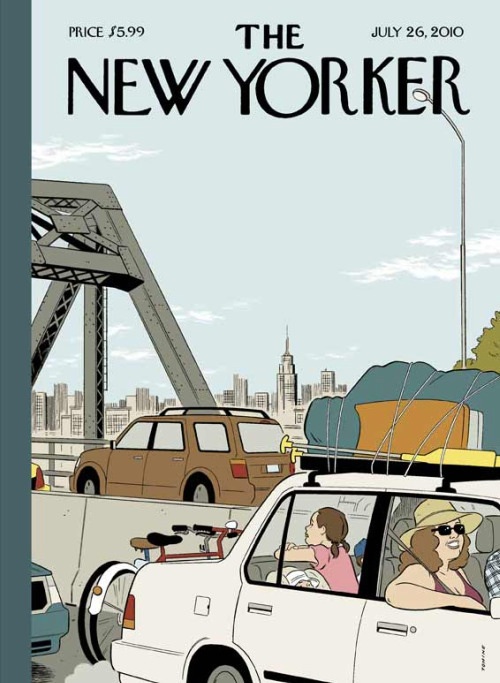Some presses put me directly in touch with authors. I speak of dreading that experience, but the exchanges are often pleasant and rewarding.
Most of the time, a press's managing editor sends me a job, and I edit and return it to the managing editor. No mess, no fuss. I also can say certain things to the managing editor about a book that would be more difficult to say to an author.
[Sometimes, though, I wonder if presses don't
always know when there's such a problem with the manuscript, and they want the anonymous copyeditor to blame when they bring the hammer down on the author.]
When I'm put in touch with the author, I can't hide behind the anonymity that copyediting usually provides. Thankfully I've never had the paths cross of Author Contact and Rancid Book. I recently had one back to back with the other, and I started thinking how fortunate that the author I was dealing with had written a very nice book and wasn't trying to pass off a bunch of financial and demographic research done in 2004 in the present tense as if it were still relevant.
But I digress. Imagine that.
In a recent project I copyedited, the press had coded the book before it came to me. Thus, the material below in angle brackets appeared before most blocks of copy. The material following the second bracket is what the code stands for:
<2HT>Second half
title
<A>A-head
<ACK>Acknowledgments
<B>B-head
<BIB>Bibliography
<BMH>Back matter head
<BML>Back matter list
<BMT>Back matter text
<BQ>Block quote
<CN>Chapter number
<COT>Chapter opening
text
<CPT>Chapter part
title
<CT>Chapter title
<DED>Dedication
<DIA>Dialogue
<ESIGN>End of
<SIGN>
<FMH>Front matter
head
<HT>Half title
<L>List, unnumbered
<LH>List head
<LTR>Letter opening
<LTRT>Letter text
<N>Notes
<NH>Notes head
<NL>Numbered list
<NLH>Numbered list
head
<P>Poem
<PN>Part number
<PST>Part subtitle
<PT>Part title
<SB>Strong break
<SIGN>Used for
newspaper article titles, etc.
<T>Regular text
<T1>First paragraph
of text
<TFL>Text flush left
<TOCBM>Table of
contents back matter
<TOCCN>Table of
contents chapter number
<TOCCT>Table of
contents chapter title
<TOCFM>Table of
contents front matter
<TOCPN>Table of
contents part number
<TOCPST>Table of
contents part subtitle
<TOCPT>Table of
contents part title
<TP>Title page
NOTE: Ethnographic
sections, which should be typographically distinct from regular text, are
indicated by an “E” preceding individual code elements (e.g., <ETFL> for
ethnographic text flush left, etc.).
This manuscript has more elements than most, but a list half this size isn't uncommon for most books. Part of what I do -- when the press doesn't do it first -- is put similar codes in the manuscript myself, thus telling the designer how to lay out the book. Put as simply as my brain can understand it, the designer can set up a certain style for chapter heads, search all text coded <CH>, apply style to code, and voila. Of course, there's a whole lot that goes on after that and before that, and nothing is quite that simple, but that's what the codes are for.
For this reason, authors, the look of a manuscript ultimately doesn't matter.
Theoretically you could send a manuscript to a typesetter in 4-point Ridiculous, superscripted, and as long as these codes are in place, the designer should be able to work jes' fine.
The obverse (?) is also true. No matter how much you try to fancy up your manuscript, there's a point of diminishing returns for everyone down the line -- and you, too. A properly coded manuscript needs no formatting other than bold and italics and a few other things that import into design software. Boxes and shading and all that goes away, and a designer needs to re-create it.
That's why an author should never put boxes and shading and auto-lists and all that other unnecessary noise in a manuscript in the first place.
Not that this author did. Well, actually I don't know, because the press obviously intervened on the manuscript before I saw it. But when I compiled my answers to some of the author's concerns, I noted that many of them dealt with how the manuscript looked, and the codes -- which, after all, are significant to me (duh, like knowing proofreading marks and reading subway maps -- aren't these universal survival skills?) -- weren't much help to the author.
My email to the very nice author follows, and please note that this was not my initial correspondence with the author. We'd already established a rapport and worked some things out between us, with some give and take on both sides. This email was sent essentially after my work was complete.
Hi. Just responding to some of your queries, so you don’t
worry about this stuff.
1. The columns of contributions not lining up -- actually,
they are, in theory. There’s a tab space between each number on each line, but just not a
tab in the ruler, so the spacing is all different in appearance. Once the
designer imports that text, the tabs will be there, and everything will line up
pretty.
2. <LH>Oyster Dressing.
You’d wondered about this not being bold. The designer
determines all those specs at typesetting time. The LH indicates it’s a head. I’m
sure it’ll all make sense on the page.
3. You should be reborn a human being so that you will
have a good life.” [Q: Shouldn’t there be end quote marks here (or
somewhere) to close the instruction?]
No, because the text preceding it is set as a prose extract.
4. [Q: Can we put a blank line between the ends of all
the poetry sections and the next paragraphs? It bothers me that it
all looks so crowded.]
Again, that’s a design thing that will be resolved at
typesetting. There’s typically space around extracts and lists in most books.
Don’t worry about how the manuscript looks. The designer goes by the codes, not
the spacing on the page.
5. <CT>Silk Stories [Endnote 1 is here after “Silk
Stories,” not at the end of COT]
No can do. Note markers after chapter titles, heads, etc.,
are verboten. Needs to go after the first next logical block of running text,
usually the first sentence -- as done here.
6. Need to keep “nowhere” lowercase in “middle of nowhere”:
From Merriam-Webster’s 11th Collegiate: middle of nowhere : an extremely
remote and isolated place *ran out of gas in the middle of nowhere.
If we wanted to uppercase the term, really it would be
Middle of Nowhere, Montana, but we shouldn’t do that either.
Hope that helps.
===
Happy Thanksgiving, folks. Hope it was a good one. We forsook the home event, and three of us -- myself, my wife, our younger son -- drove to Weaverville, NC, to a nice little restaurant and had a delightful meal and walked around a little afterward. Back home, nothing but another night at home. Nice change of pace. No preparation, no clean-up, and 90 minutes or so of quiet conversation that might be better than we'd get at home, with all the jumping up and down around the table that would be going on. My younger son's the type whom sometimes you don't know what's going on until you ask, and some of the time you don't even know what to ask, so the occasional direct answers and questions we get out of him in such situations are always helpful. His older brother has gone through parts of his life when we seemed to hear most of the goings-on in his head. That has never, ever been the case with our younger issue. I guess there's benefits to both. And it comes and goes. Once our younger son gets on a roll, it's nice to find out what's happening in his life.
I'll probably fry a turkey at Christmas, but I think we just made it a family tradition to get the hell out of town and go eat somewhere else on Thanksgiving. I guess it's our Central Appalachian version of Thanksgiving in Chinatown, which we've also done. With Asheville and environs 75 minutes of a beautiful drive down the road, that's not a problem.
 |
| View from 19/23, Tennessee/North Carolina |










